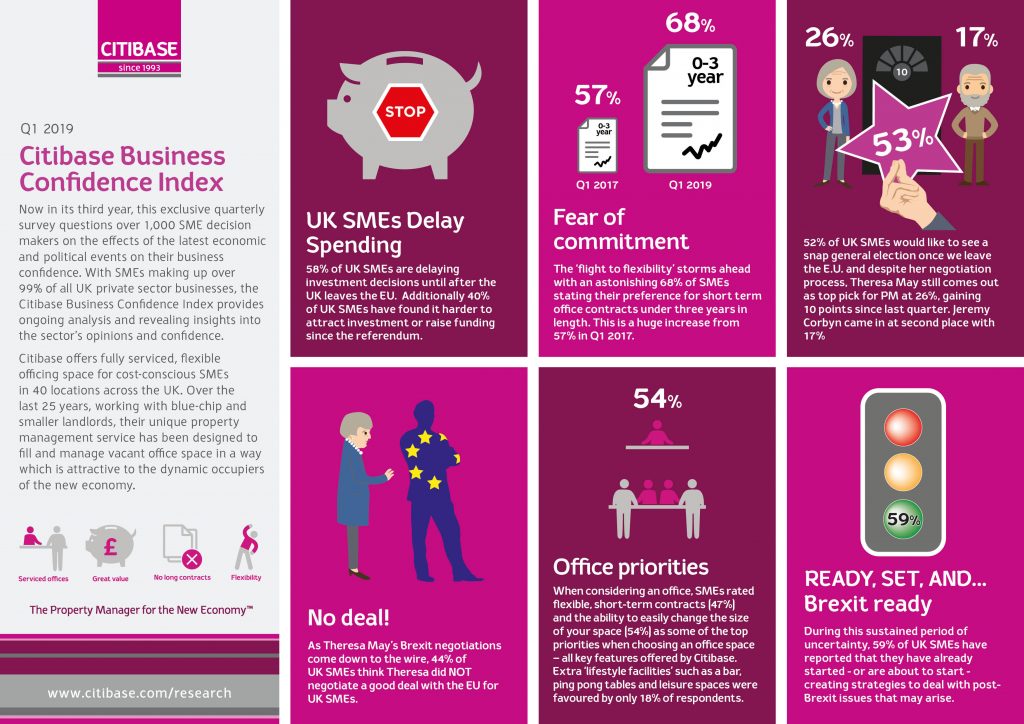 Back to all news
Back to all news

UK SMEs unimpressed with Brexit negotiations – resulting in delayed investment decisions

• 58% of UK SMEs are delaying investment decisions until after Brexit • 59% feel ‘Brexit-ready’ – confident that they can adapt to new rules and regulations within one year of formally leaving the EU • 68% of UK SMEs have seen revenues rise or stay the same since the referendum, down from 71% in […]
• 58% of UK SMEs are delaying investment decisions until after Brexit
• 59% feel ‘Brexit-ready’ – confident that they can adapt to new rules and regulations within one year of formally leaving the EU
• 68% of UK SMEs have seen revenues rise or stay the same since the referendum, down from 71% in Q4
• 65% state that they expect revenues will rise or stay the same once Brexit has happened and the UK has left the EU – down from 69% in Q4
• 40% have found it harder to attract investment or raise finding, down from 50% in Q4
• 53% of UK SMEs would like to see a snap general election after Brexit, down from 62% last quarter
As Theresa May’s Brexit negotiations come down to the wire, 44% of UK SMEs think Theresa May did not negotiate a good deal with the EU for SMEs, according to the latest Citibase Business Confidence Index, now in its third year. Additionally, 53% of UK SMEs would like to see a snap general election after Brexit.
The exclusive quarterly survey of 1,057 SME decision makers by flexible office champion Citibase, reveals that during this sustained period of uncertainty, many UK SMEs are taking the initiative, with 59% reporting that they have already started – or are about to start – creating strategies to deal with post-Brexit issues that may arise.
Part of the preparation during these uncertain times includes de-risking when it comes to office contracts, with 68% preferring office contract lengths of less than three years, up from 57% at the start of 2017. Additionally, when considering an office, SMEs rated flexible, short-term contracts (47%) and the ability to easily change the size of your space (54%) as some of the top priorities, both increasing in popularity since Q1.
While often grabbing headlines, lifestyle facilities such as gyms and wellness areas ranked poorly (18%) in terms of importance, suggesting that SMEs crave flexibility as they approach the deadline and want to get on with running their businesses without costly extras.
Financially, 68% of UK SMEs have seen revenues rise or stay the same since the referendum and 65% that they expect revenues will rise or stay the same once Brexit has happened and the UK has left the EU, suggesting small businesses are feeling financially positive going into Brexit.
Furthermore, 40% have found it harder to attract investment or raise finding, down from 50% in Q4. Those in London (61%) and the North West (59%) have found it most difficult. Furthermore, 58% of UK SMEs are delaying investment decisions until the dust settles.
Citibase also reveals that 32% of UK SMEs reported changing the supply chain would be the first action taken in post- Brexit Britain, followed by reducing the labour force at 16%.
Theresa May still comes out as top pick for Prime Minister at 26% gaining 10 points from last quarter, showing she is still number one pick to lead the country. Jeremy Corbyn came in at second choice with 17%, followed closely by Boris Johnson at 14%.
Steve Jude, Citibase CEO, comments: “Because of the uncertainty around these historic negotiations with Europe it’s no surprise that UK SMEs crave flexibility, affordability and agility, which is why office contacts between one and three years are the most desired. SMEs are cautious about the future and don’t want to commit to anything that may stifle their success, which is why the flexible office sector is sector growing at a record rate, as more and more businesses reject the traditional long lease model.”
“Smart building owners can also benefit from this revolution in occupiers shunning traditional office leases, by turning to flexible providers like Citibase that can transform their underused spaces, whether single floors or entire buildings, into profit generating assets that support UK businesses.”
The exclusive quarterly Citibase Business Confidence Index, now in its second year, reflects the views of 1,057 small businesses across a wide variety of sectors including marketing, PR, financial services, travel and recruitment.
Key headlines and regional splits
• 53% of UK SMEs would like to see a snap general election after Brexit. The North East expressed the greatest desire for a snap election at 78%.
• Theresa May as the preferred candidate for Prime Minister at 26%. In the North East and North West Boris Johnson is the favourite (25% and 19% respectively)
• 44% of UK SMEs don’t think Theresa May negotiated a good deal for UK SMEs. The greatest disapproval of Theresa May’s negotiations were in Scotland (69%) and the South East (69%), followed by the Midlands at (57%)
• 68% of UK SMEs desired short term office contracts of three years or under, up from 57% in 2017
• 61% of SMEs would like to reverse the Brexit process and stay in the EU – down from 65% last quarter. The North East have the greatest desire to reverse the Brexit process at 79%
• 40% of SMEs have found it harder to raise funding or attract investment since the referendum – down from 50% in Q4. Those in London (61%) are most likely to have found it more difficult
Our latest news and blogs
Need help finding your new office?
Get in touch:










